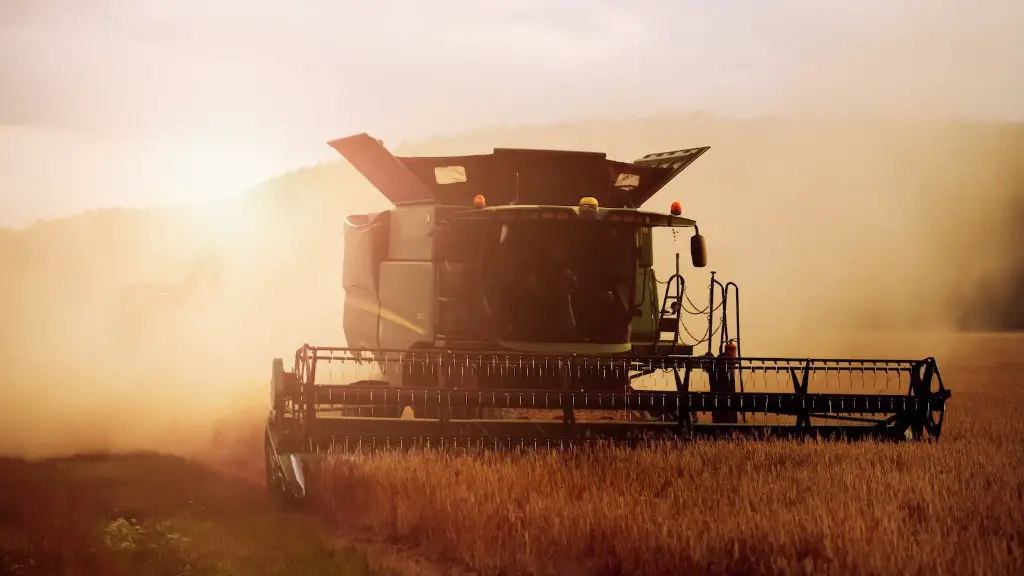Agriculture has a strong and long-term impact on economic development in countries all over the world. It not only provides food and fiber, but also helps to boost job growth and infrastructure investment. For example, agricultural production can lead to an increase in exports, providing an influx of income. Additionally, agricultural industries often give rise to other industries, creating jobs and diversifying other sectors of the economy.
In many rural areas, agricultural production is the major source of employment. This supports families and provides much-needed tax revenue for local governments. It also helps to create a strong local market, allowing for increased investment in infrastructure, housing, education, and healthcare. For instance, when farmers invest in irrigation systems or new technologies, this drives up the value of their land and increases production, thereby creating more economic opportunities. Furthermore, access to more efficient land management and better infrastructure encourages investment in the local area.
Agriculture also plays an important role in maintaining the environment. Sustainable agricultural practices help to reduce land degradation and soil erosion, while promoting efficient water use. This helps to protect ecosystems, while providing an economical way to produce food. Additionally, these practices can be a source of income, as farmers are able to sell the crops or produce more efficiently, with more diverse products, leading to an increase in profits.
Agriculture is also a key sector in many developing countries, as it is an important source of income and a way of life for many communities. It provides a broad array of income-generating activities, such as crop production, livestock keeping, and marketing. By improving infrastructure and access to credit, farmers are able to increase their production and boost their income. This often leads to improved health, education, and social opportunities, as well as increased access to markets.
By investing in agricultural production and sustainable practices, countries are able to create a stronger and more resilient economy. Additionally, this investment can have a positive effect on the environment, as it can help to reduce land degradation and soil erosion, while promoting efficient water use. Finally, it helps to provide employment opportunities, contributing to an overall increase in economic development.
Agricultural Inputs and Knowledge Sharing
Agricultural inputs such as farm machinery, seed, fertilizer, and pesticides contribute towards food security, yield improvement and improved cash income from crop production. The availability of suitable farm inputs has a positive effect on the economic returns from agricultural activities, and their use is a key indicator of economic access and use of the latest knowledge about farming techniques. In addition, the availability of agricultural inputs, combined with knowledge about farming techniques and access to suitable markets and institutions – including credit, transport, and storage facilities – provide opportunities for agricultural entrepreneurs to increase their income and help develop a stronger, more efficient agricultural sector.
Knowledge is an important element of farming, and efficient knowledge sharing and learning is critical to the success of an agricultural enterprise. Farmers who acquire knowledge to improve production have greater chances of obtaining higher yields, increased income, better access to markets and higher incomes. Knowledge sharing involves providing up-to-date and relevant information, both in the form of training and resources, to help farmers improve the practices they use in their agricultural activities. This includes better methods of production, improved marketing tools and advice, assistance in troubleshooting and making decisions, and encouragement to build networks.
Access to quality agricultural inputs and knowledge sharing also improve market access and provide necessary resources for smallholder farmers, allowing them to participate in higher value-added markets. Projects that provide access to inputs and knowledge to smallholder agricultural entrepreneurs can be an important part of rural development. Through such projects, farmers’ incomes, employment rates, and food security can be improved, as well as equitable access to markets, financial resources and technology.
Agricultural Research and Extension
Agricultural research and extension activities help to inform farmers about the latest developments in agricultural technologies and innovations. These activities play an important role in enabling farmers to improve their incomes, reduce the risk associated with agricultural production, and improve yields. Such activities are also essential in providing information about markets, credit and insurance and in helping farmers to acquire the necessary materials needed for productive farming.
Research and extension activities provide a platform for agricultural experts and stakeholders to collaborate, share experiences and exchange ideas, which contributes to informed policy making. They offer a unique and valuable source of unbiased research and help to identify best practices. Agricultural research and extension activities therefore help to strengthen farmer understanding of their environment and increase the profitability of their operations. Research-extension partnerships also have an important role to play in facilitating sustainable agriculture and fostering a healthier, more productive agricultural landscape.
Support for agricultural research and extension is critical in a broader context, as it contributes to food security, improved income, sustainability, and greater resilience to climate change and other shocks. Research and extension activities also help to ensure improved management of inputs, timely information and better decision making, helping to reduce input cost and improve farm efficiency. Furthermore, research and extension activities can provide the necessary incentives to increase agricultural investments in developing countries, ultimately improving sustainable economic and agricultural development.
Agricultural Credit Programs
Agricultural credit programs are an important tool for assisting smallholder farmers in improving their economic circumstances. By giving farmers access to capital, these programs help to create new economic opportunities and make agricultural businesses more viable. Such programs can support smallholder farmers by providing access to credit, allowing them to invest in improving their agricultural production, purchase viable inputs and increase their yields. This can help them to become economically independent, and make a bigger contribution to their communities.
Agricultural credit programs also help to reduce poverty by enabling farmers to access the necessary resources to increase their yields. For example, they can make it easier for farmers to purchase inputs and machinery, which can in turn increase their income. Furthermore, access to credit also provides farmers with the opportunity to diversify their agricultural activities, increase crop diversity and develop new skills. In addition, access to credit can help farmers to diversify their income sources and reduce their dependence on crop yields and prices.
Another important advantage of agricultural credit programs is their ability to provide the necessary incentives to smallholder farmers to invest in their operations. These programs create an environment where farmers are able to access more resources and incentives to improve agricultural output and yields. This type of incentive provides the necessary motivation to increase their investments in agricultural activities, which in turn helps to create a greater impact for local communities.
Development of Rural Infrastructure
The development of rural infrastructure is crucial to improving economic development in rural areas. Access to quality infrastructure, such as roads, telecommunications and energy systems, is essential for connecting farmers to markets, agricultural inputs and other resources. Investments in infrastructure in rural areas can be the catalyst to increasing agricultural production, improving access to markets, increasing productivity and creating employment. Improved infrastructure can also help to promote the development of value-added activities such as food processing, storage, and transport.
Rural infrastructure can enhance farmers’ access to markets, inputs and resources, but it is also important to consider the social, environmental and human impacts of such infrastructure. There are also potential downsides to infrastructure development, such as increasing inequality, increasing land concentration and displacement of smallholder farmers. It is important to consider the impacts of infrastructure development and ensure that it does not result in adverse effects on local communities, particularly the most vulnerable.
In addition to basic infrastructure, investments in agro-processing and other artisanal activities can help to increase returns from agricultural production and expand employment opportunities. By providing access to raw materials and technical expertise, such investments can help to enhance infrastructure in rural areas and increase the economic returns from agricultural production and other industries. Public-private partnerships for infrastructure development and investment can also be an effective way of creating employment and promoting greater economic opportunities in rural areas.
Conclusion
Investment in agricultural production, knowledge sharing and access to agricultural inputs are important elements of development in many countries all over the world. Through such investments, countries are able to create a stronger and more resilient economy and help to reduce poverty, while also providing employment opportunities and protecting the environment. In addition, it is critical to consider the role of agricultural credit programs, rural infrastructure development and other artisanal activities in promoting economic development and improving the livelihoods of smallholder farmers and the most vulnerable in rural areas.




